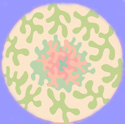

Consciously Whole |
The idea that
complex order arises through self-organization of simpler components
is a new current in scientific thought. In the sciences of complexity,
the view is maintained that order in the universe arises spontaneously — that it is an inherent property of nature. We observe a self-ordering process wherein individuals,
be them cells, organisms, or populations, develop complex networks
of relationships. What is intriguing and of profound significance
is that nature's networks form solely on the basis of the individuals'
propensity to interact. They are self-organizing. |
Simple components
interact and as the extent of their interaction exceeds a threshold
value, they become organized. The newly organized components then
exhibit novel behaviors or activities — in other words, they exhibit
an emergent property. The now organized components continue to
interact with other organized components giving rise to higher
and higher levels of order and exhibiting additional emergent
properties. The net result is the development of a complex and
interactive system capable of evolution through adaptation.
|
Workers
in the sciences of complexity speak of living organisms and their
organ systems as complex adaptive systems. The human brain, which
is widely believed to be the seat of consciousness, is a complex
adaptive system par excellence: the multitude of interconnecting
neurons and the endless interactions among them across the synapses
creates a neural network that is capable of creating novelty,
of emergence. Learning would be an example of this sort of brain
emergence - the capacity to learn is not present in the individual
neurons but arises as a result of their interactions.
|
Perhaps
consciousness itself is an emergent property of the brain. Perhaps
human consciousness is a complex adaptive system and as such,
has the capacity to self-organize and create emergent order. That
is to say that our minds have the capacity to organize themselves
and thereby our world by their own accord. What are dreams if
not the expression of a self-organizing consciousness? |
At
this point, a broader question is raised: if the physical world
outside of us is self-organizing and complex and our internal,
mental world is also self-organizing and complex, how is it that
our behavior is so out of sync with the essential features of
these two worlds? Or put differently, why is it a struggle for
us to cooperate, to share, to safeguard our environment and its
life forms when we, ourselves, are the embodiment of the principles
of cooperation and interdependence? |
We
are reflections of self-organized complexity. We are its embodiment
as well. I believe that visual imagery that embodies this fundamental
principle can stir us to wakefulness; that our own self-organizing
consciousness will recognize itself in the imagery and remember;
as a result we may unconsciously succeed in rekindling a connection
to our own nature as beings — irreducible, interdependent, and
an inextricable part of a much greater whole. |
© copyright 2023, Jim Modiano